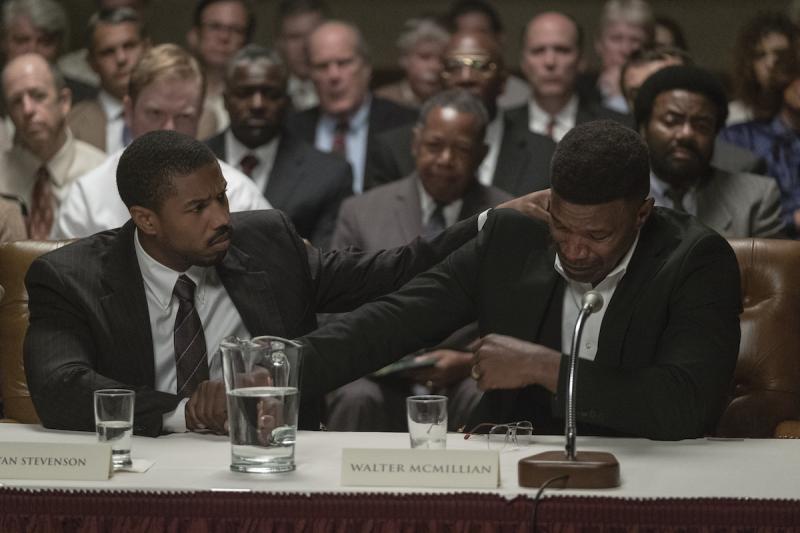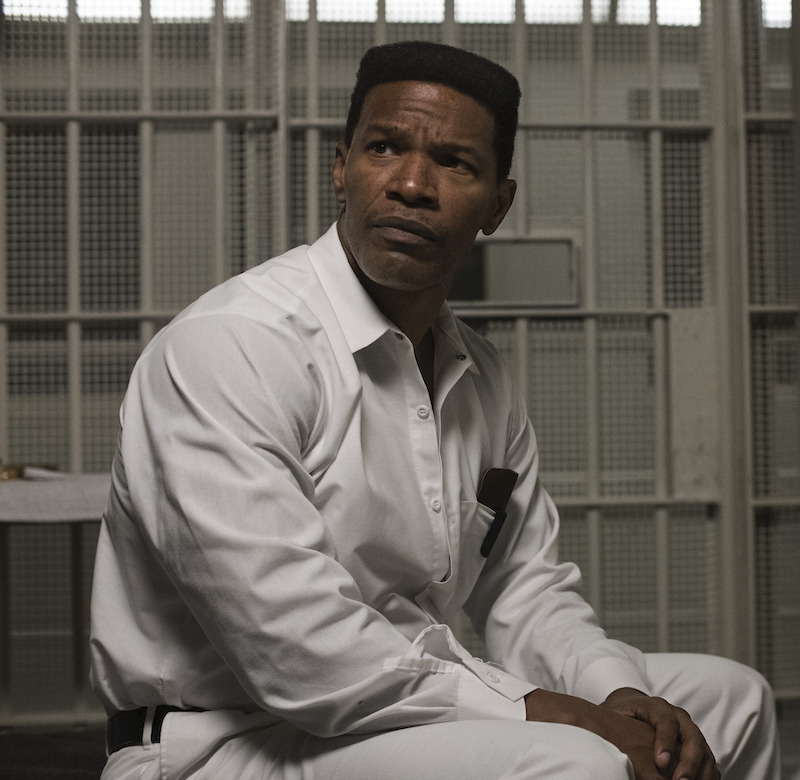Just Mercy review - soul-stirring true story about race and justice in America | reviews, news & interviews
Just Mercy review - soul-stirring true story about race and justice in America
Just Mercy review - soul-stirring true story about race and justice in America
Biopic retells a powerful narrative about perseverance in the face of injustice

Just Mercy, the latest film from Destin Daniel Cretton (Short Term 12), is based on a New York Times bestseller. It has a star-studded cast. It’s emotionally moving as well as intellectually accessible. But it’s no easy film to watch.
Just Mercy is based on a memoir by Bryan Stevenson, an American civil rights attorney who has spent his life working with adults and children condemned to die in jail. It begins with Bryan (Michael B. Jordan) moving to Alabama, fresh out of Harvard, to set up a pro-bono legal service with Eva Ansley (Brie Larson). Their work is gravely unpopular: they’re hounded by bomb threats and a biased local justice system. But Bryan keeps finding reasons to fight. One reason is Walter McMillian (Jamie Foxx), a black man convicted on paper-thin evidence and sentenced to death for the murder of a white teenage girl.
From there, Just Mercy progresses like a procedural drama. It zeroes in on Walter’s case and follows it back through court. But there is a tweak in the formula. Walter’s innocence is never in question. Instead, the film’s dramatic arc comes from staging continual face-offs between corruption and decency, in the courtroom and within individuals. Meanwhile, Just Mercy asks a different question: can we achieve justice in a biased system? “You know how many people in Alabama been freed from death row?” asks Walter (pictured below), during his first visit from Bryan. “None. You think you gonna change that?”
 Emotionally, parts of this film are almost torturous. It’s filled with tightly-cropped shots of agonised faces, claustrophobic encounters and racist aggressions. Two of Just Mercy’s scenes are vehicle stops by police officers: tense moments, but also traumatic symbols of our historical past and our political present. Yet with a name like Just Mercy, you would be right to think that hope is at the core of this film. Relief comes in the form of faith and community strength, represented by Walter’s wife, children and community. And it comes in the form of decency and tenacity, modelled by Bryan.
Emotionally, parts of this film are almost torturous. It’s filled with tightly-cropped shots of agonised faces, claustrophobic encounters and racist aggressions. Two of Just Mercy’s scenes are vehicle stops by police officers: tense moments, but also traumatic symbols of our historical past and our political present. Yet with a name like Just Mercy, you would be right to think that hope is at the core of this film. Relief comes in the form of faith and community strength, represented by Walter’s wife, children and community. And it comes in the form of decency and tenacity, modelled by Bryan.
Heavy themes are shouldered by a strong cast. As Walter, Foxx gives a remarkably moving performance. He shows Walter’s generosity as well as his sense of betrayal; his numbness as well as his yearning. Rob Morgan is startling as Herb, a fictionalisation of one of Stevenson’s other real-life clients. It is through Herb that Just Mercy delivers its most powerful political statement: a full-throated indictment of capital punishment. The hushed moments between him, Walter and Bryan are heart-rending, restrained despite their subject matter.
This film’s only misstep is its occasional tendency to labour the point, however well-made. As Bryan, Jordan gives a nuanced performance as a young lawyer curbing his idealism. But the film version of Bryan never outgrows his earnestness – at several points, the dialogue verges on proselytisation. This is clearest in the film’s final scenes: a too-claustrophobic argument with the District Attorney (Rafe Spall) and a too-ethereal light that haloes Bryan following his last appearance in court. This is too bad. There's a vital message behind the oratorial gleam.
In some ways, this film is a simplification of a narrative that already found its finest form – in Bryan Stevenson's searing memoir, upon which the film was based. But this is a story that demands telling and retelling. Despite some small overreaches, Just Mercy is a modern parable of perseverance and integrity, well-acted and well-paced. For that reason, it is a total triumph. It deserves to be watched as widely as its star power will carry it, then further still.
rating
Explore topics
Share this article
The future of Arts Journalism
You can stop theartsdesk.com closing!
We urgently need financing to survive. Our fundraising drive has thus far raised £49,000 but we need to reach £100,000 or we will be forced to close. Please contribute here: https://gofund.me/c3f6033d
And if you can forward this information to anyone who might assist, we’d be grateful.

Subscribe to theartsdesk.com
Thank you for continuing to read our work on theartsdesk.com. For unlimited access to every article in its entirety, including our archive of more than 15,000 pieces, we're asking for £5 per month or £40 per year. We feel it's a very good deal, and hope you do too.
To take a subscription now simply click here.
And if you're looking for that extra gift for a friend or family member, why not treat them to a theartsdesk.com gift subscription?
more Film
 London Film Festival 2025 - crime, punishment, pop stars and shrinks
Daniel Craig investigates, Jodie Foster speaks French and Colin Farrell has a gambling habit
London Film Festival 2025 - crime, punishment, pop stars and shrinks
Daniel Craig investigates, Jodie Foster speaks French and Colin Farrell has a gambling habit
 I Swear review - taking stock of Tourette's
A sharp and moving tale of cuss-words and tics
I Swear review - taking stock of Tourette's
A sharp and moving tale of cuss-words and tics
 A House of Dynamite review - the final countdown
Kathryn Bigelow's cautionary tale sets the nuclear clock ticking again
A House of Dynamite review - the final countdown
Kathryn Bigelow's cautionary tale sets the nuclear clock ticking again
 theartsdesk Q&A: Idris Elba on playing a US President faced with a missile crisis in 'A House of Dynamite'
The star talks about Presidential decision-making when millions of lives are imperilled
theartsdesk Q&A: Idris Elba on playing a US President faced with a missile crisis in 'A House of Dynamite'
The star talks about Presidential decision-making when millions of lives are imperilled
 Urchin review - superb homeless drama
Frank Dillane gives a star-making turn in Harris Dickinson’s impressive directorial debut
Urchin review - superb homeless drama
Frank Dillane gives a star-making turn in Harris Dickinson’s impressive directorial debut
 Mr Blake at Your Service review - John Malkovich in unlikely role as an English butler
Weird comedy directed by novelist Gilles Legardinier
Mr Blake at Your Service review - John Malkovich in unlikely role as an English butler
Weird comedy directed by novelist Gilles Legardinier
 Don't Let's Go to the Dogs Tonight review - vivid adaptation of a memoir about a Rhodesian childhood
Embeth Davidtz delivers an impressive directing debut and an exceptional child star
Don't Let's Go to the Dogs Tonight review - vivid adaptation of a memoir about a Rhodesian childhood
Embeth Davidtz delivers an impressive directing debut and an exceptional child star
 One Battle After Another review - Paul Thomas Anderson satirises America's culture wars
Leonardo DiCaprio, Teyana Taylor, and Sean Penn star in a rollercoasting political thriller
One Battle After Another review - Paul Thomas Anderson satirises America's culture wars
Leonardo DiCaprio, Teyana Taylor, and Sean Penn star in a rollercoasting political thriller
 Steve review - educator in crisis
Cillian Murphy excels as a troubled headmaster working with delinquent boys
Steve review - educator in crisis
Cillian Murphy excels as a troubled headmaster working with delinquent boys
 Can I get a Witness? review - time to die before you get old
Ann Marie Fleming directs Sandra Oh in dystopian fantasy that fails to ignite
Can I get a Witness? review - time to die before you get old
Ann Marie Fleming directs Sandra Oh in dystopian fantasy that fails to ignite
 Happyend review - the kids are never alright
In this futuristic blackboard jungle everything is a bit too manicured
Happyend review - the kids are never alright
In this futuristic blackboard jungle everything is a bit too manicured

Add comment